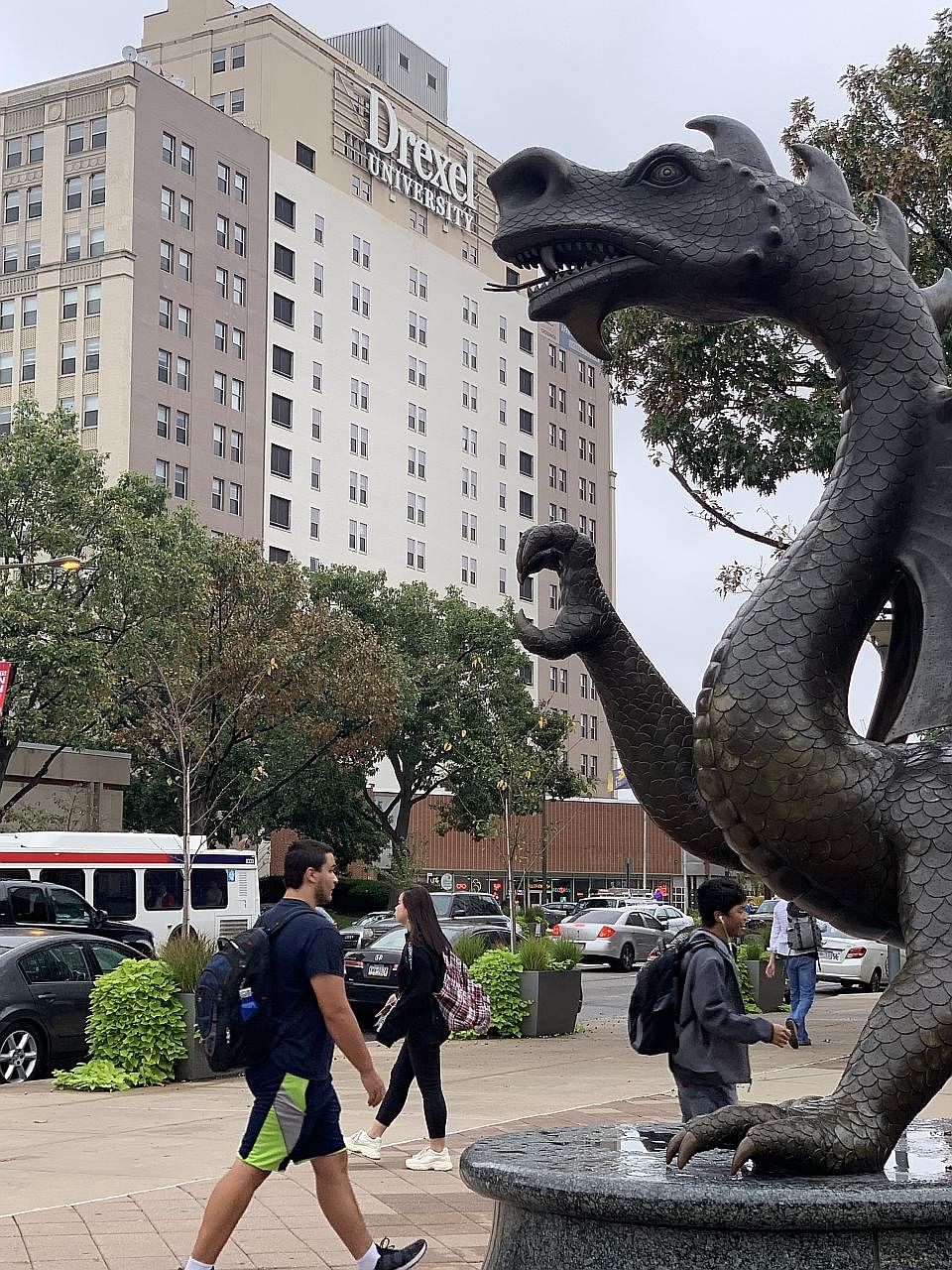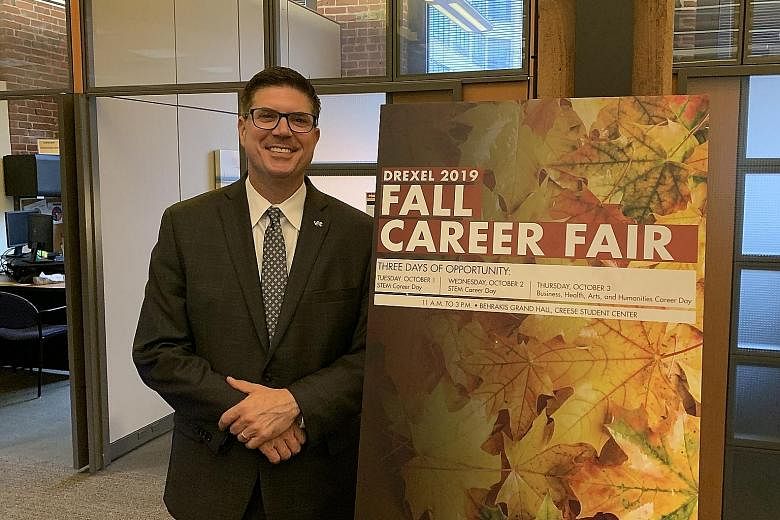How can graduates improve their job prospects?
And if they graduate into a slowing economy, how can they recession-proof their careers?
Drexel University's vice-president for cooperative education and career development, Mr Ian Sladen, says: "Go and get a good degree education, but while there, go on as many working attachments as possible."
It is sound advice from years of data collected by the Philadelphia-based university on the job prospects of its graduates, most of whom extend their degree studies to go on several work attachments.
Drexel University - which last year celebrated 100 years of its famous work-study programme, called "cooperative education" in the United States - now has about 5,000 students a year going for work attachments in more than 1,600 companies and organisations, including welfare organisations, non-governmental organisations and research labs.
Students are encouraged to extend their degree studies to five years, so that they would have enough time to go on three work attachments lasting six months each.
The graduate employment survey results speak for themselves.
The survey of the graduating class of 2017 shows that more than 90 per cent are employed or pursuing higher education, with 62 per cent reporting that they had at least one job offer upon graduating.
Half the students who went on work attachments had received a job offer from a former employer.
The average annual salary of a Drexel graduate one year after graduation is close to US$60,000 (S$81,000), 18.5 per cent above that of peers from other universities in the country.
Mr Sladen goes into how combining work and study results in stellar job prospects for his students.
Q Drexel celebrated its 100th year of co-op education last year. How did it start?
A Drexel's cooperative education programme, founded in 1919, was one of the first of its kind, and it continues to be among the largest and most renowned.
It stemmed from founder Anthony J. Drexel's belief that the university should be an institution committed to preparing its men and women for successful careers through an education that balanced classroom theory with real-world practicality.
When the programme was launched by the College of Engineering, it was in the wake of World War I, and the university was committed to supporting the post-war economy by creating the co-op programme.
Today, Drexel operates one of the largest cooperative education programmes in the nation. More than 1,650 business, industrial, governmental and other institutions cooperate with Drexel in offering students the opportunity to acquire practical experience in employment related to their studies. Drexel students also have the opportunity to explore research, national and international co-op experiences.
Q Why is it called cooperative education?
A In many parts of the world, it is called "integrated work-study programmes". In the US, it is called cooperative education, because for it to work well, there must be full participation and cooperation by employers, the students and the academic institution.
And it benefits everyone involved.

The employers benefit in being able to assess and recruit talents. They also gain from the latest theories and fresh ideas from the academic world. The institution gets practical input from the professional community, and the students receive hands-on experience in their chosen field of study.
The information we gain from students and employers is important to us. Co-op programmes rely on feedback from employers and students to keep up with skills needed in the workplace, and to assess if our students match up to their needs. Students will tell us if they don't have the necessary skills and knowledge to do the job.
At the same time, we will lose employers if the students don't have the right skills. We need to know where industries are going to stay on the right track. It also enables us to enhance co-curricular programming to nurture in our students the soft skills that are demanded by employers. It is truly cooperative education.
Q Co-op education has become the value-add proposition for your university, with the majority of students choosing the university because of the programme. How did that happen? Especially considering that students would have to spend an extra year studying?
A Yes, when we surveyed our students, 83 per cent told us that the co-op is the No. 1 reason they come here. Why is it so popular? Because the benefits are apparent.
Students have the opportunity to work in their fields of study, exploring potential careers with well-known companies. And they bring real-world knowledge back to the classroom to share with peers. Students with co-op experience have more competitive resumes.
-
About Ian Sladen
-
Mr Ian Sladen is vice-president of cooperative education and career development, and head of the Steinbright Career Development Centre, at Drexel University.
As one of North America's premier providers of talent, Drexel University's cooperative education programme assists more than 5,500 students annually with getting six-month work experiences at more than 1,500 companies.
Mr Sladen was previously the associate dean and one of the founders of the university's Charles D. Close School of Entrepreneurship.
As associate dean, he assisted in curriculum development for the school's bachelor's and master's degrees in entrepreneurship and innovation, and helped the school achieve a top-25 national ranking in entrepreneurship by the Princeton Review within five years of its founding.
For a decade, Mr Sladen served as assistant dean of undergraduate programmes for Drexel University's Bennett S. LeBow College of Business. He was responsible for all undergraduate student-support services, including academic advising, career services, recruitment, co-curricular engagement and freshmen business studies.
He began his academic career working in admissions for Bunker Hill Community College in Boston, Massachusetts, before moving to Drexel University's admissions office in 1999.
Mr Sladen holds a bachelor's degree in psychology and a master's degree in applied educational psychology from Northeastern University in Boston, Massachusetts.
Even for those who want to go on to graduate school, the practical foundation they have gained enables them to gain entry to some of the top graduate schools in the country.
The figures speak for themselves - 96 per cent of the class of 2017 Drexel graduates are working or enrolled in graduate or professional education; 62 per cent of them had at least one job offer upon graduation.
The vast majority - 92 per cent of graduates working full time - said they were satisfied with their positions, and 89 per cent of those working full time are in professions that are closely or somewhat related to their field of study at Drexel.
Of those who had gone on co-op, 48 per cent of them working full time had received a job offer from a former co-op employer. Drexel graduates are often hired at a higher salary level than most college graduates - US$59,557 is the average annual salary of a Drexel graduate one year after graduation. That is 18 per cent above the national average.
Q Drexel strongly encourages employers to pay co-op participants salaries on a par with the industry. In fact, on average, it is more than US$18,000 for six months. Was it difficult to persuade employers to pay co-op participants?
A The average salary is about US$18,000 over six months. You add that up over the three co-op cycles, and it is quite good income. But there are some co-op positions that pay much more than that. In certain majors, students earning co-op salaries are able to more than cover their tuition with those earnings.
We ask employers to pay our students salaries. With real money on the table, employers are likely to give them real work. For the student too, since the money is real, the responsibility is real.
Q Is it true that your co-op students can apply to more than 50 jobs and go through dozens of interviews?
A Well, there are three rounds of co-op, and yes, and you can easily apply for 25 jobs in each round. We encourage them to do that. They gain a lot of knowledge and experience in writing resumes that will interest the recruiters, how to interview, the kind of questions asked and so on, even salary negotiation.
Q What about the future? Do you think cooperative education will continue to be relevant and useful?
A The reality is that technological innovation is shifting our 21st-century workforce so rapidly that there is a gap - an expanse between what the modern university can produce and what the modern job market demands. In my view, cooperative education has never been more important than it is today, and will become even more important in the future.



